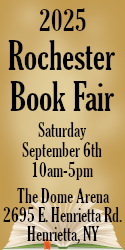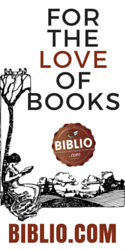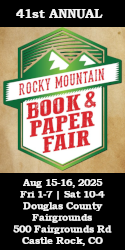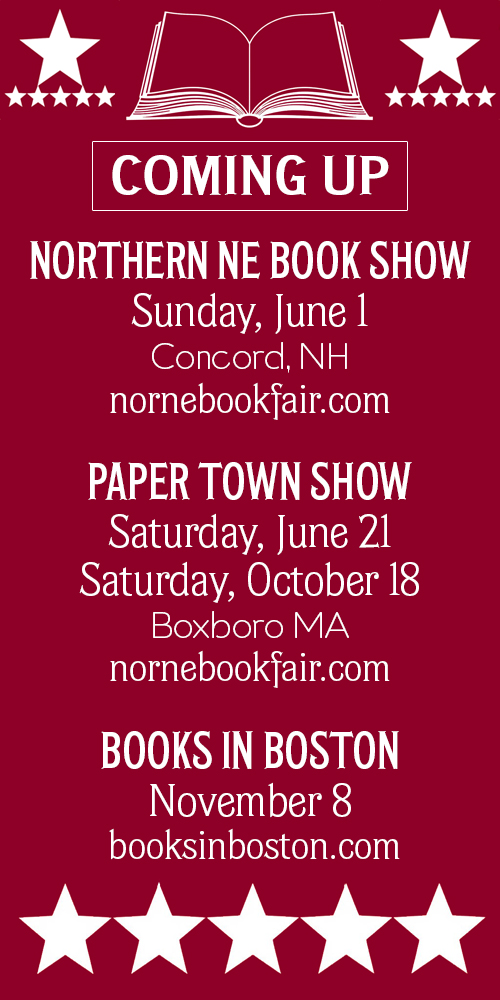Minding My Languages
One thing you have to make your mind up about, when you own a bookstore, is whether or not to stock books in foreign languages. In my case, you’d think the decision would be easy. I’m a linguist by temperament and by training, and had, by the age of twenty, achieved some proficiency in two dead, and three living, Mediterranean languages. In addition, I am a native speaker of English, though by a happy chance, as a wee bairn, I also spoke Scottish. Not the Gaelic but the Doric, the Scottish vernacular, as in “wee bairn” (small child) and “Lang may yer lum reek, laddie” which loosely rendered means “Good luck and good health” but literally translated means “Long may your chimney smoke, young man.” (If you’ve ever grappled with the poems of Robert Burns all the weird words you can’t understand are the Doric). And for seven years I labored at the chalk face, in secondary schools, attempting to coax foreign languages into, and out of, adolescent skulls.
You would imagine, then, that my bookshop, reflecting the talents and interests of its owner, would be chock full of interesting foreign language books. Alas no. I gave up the struggle years ago. There was a time when I stocked hundreds of books in French and Spanish and Italian, mostly the standard classics and also anything else of merit that I could lay my hands on. These books were much admired, much commented on, much handled by students of language, by native speakers even. And I would sell about three books per month. Nowadays I stock a total ragbag of whatever foreign texts happen to fall into my lap, I price them all at $5, and I still sell about three per month. But it no longer hurts.
I do not want to pretend, churlishly, that my knowledge of languages has not, in my career as a bookseller, been of some use. It has benefited me enormously. For one thing, my long acquaintance with Latin has rendered me totally fluent in Roman numerals. No title page with MCCXLVIII at the foot holds any mystery for me. Nor is this the only Roman compound numeral that I can decipher. I am totally at ease with those pages marked iv – xxxii which keep appearing at the beginning of books. And another thing. Whenever I am required by my professional body to fill in a questionnaire which asks me to state the languages other than English in which my business is able to conduct correspondence I list them boldly thus: French, Italian, Spanish, Latin, Ancient Greek. While it is true that I have never actually conducted any correspondence in Latin or Ancient Greek, I think people would be reassured to know that should the need arise the man at the helm could cope.
Come to think of it, I have never actually conducted any correspondence in French or Italian or Spanish either. Which just goes to show how fortunate we are, we native English-speakers, to have English as our mother tongue. English is the lingua franca of global business. What do a Peruvian and a Russian talk when they get together? No, not Prussian; (don’t be perverse). They talk English, of course. No surprise that the official language of ILAB (The International League of Antiquarian Booksellers) is English, though it maintains the charming fantasy that this role is shared equally with French. The motto of ILAB is in the old lingua franca: “Amor librorum nos unit.” The love of books unites us.” Some scallywag once amended this by one letter to “Amor librarum nos unit” which means “The love of pounds sterling unites us” which I for one do not find in the slightest bit funny since if anything it is the love of dollars, or perhaps euros, which unites us. Pounds sterling are just annoying. Why can’t Britain join the European Monetary Union and use euros like everyone else over there?
It is surprising, given the sluggish sales of books in modern foreign languages, how quickly texts in ancient foreign languages whiz out the door. Some older customers clearly feel the nostalgic tug of the Classics which they studied years ago at school or university; others are having a first go at Latin and Greek late in life having enrolled in classes put on by the Council for Adult Education or The University of the Third Age. A surprisingly large number of young people are also interested: only one secondary school in Melbourne, Xavier College, offers Ancient Greek as an option, but Latin is taught quite widely at secondary and tertiary levels. I should like to have an inexhaustible supply of cheap Loeb classics, Greek lexicons and Latin dictionaries, to meet the steady demand. And—amazingly— there is a constant trickle of students from the local Catholic seminary who, despite Vatican II, are still required to grapple with Latin, not to mention New Testament Greek and Old Testament Hebrew. I say “amazingly” not because these young men come looking for books, but because young men in training for the Roman Catholic priesthood still actually exist. I recently read somewhere that all applicants for the priesthood, in addition to the traditional obstacles strewn in their path, now have to pass a psychological test. What did St. Augustine write? “Da mihi continentiam et castitatem, Domine Deus, sed noli modo.” (Grant me continence and chastity, Lord God, but not yet). St. Augustine would certainly pass today’s examination in Latin but could he possibly survive the psychological inquisition?
A few months ago I bought a large collection of books to do with Catholic religion and theology. Most of them were once the property of a number of Archbishops of Melbourne. My favorite is a book which has a Prize Label on the front free endpaper: “St. Patrick’s College. Awarded to F. Little. For Dancing 1940. From Eileen Brenan.” The Rt. Rev’d. Dr. Sir Frank Little was Roman Catholic Archbishop of Melbourne from 1974 to 1996. He died only a few months ago aged 82. It’s touching to think of him winning a prize for dancing at the age of 14. Would a love of dancing be a plus or a minus at the priestly psychological test? It is a shame that Archbishops have no issue; so there is no son or daughter to whom I can present this book.
I am staggered by the weighty learning of these theological books. And by their dryness—metaphorical and literal. I am sure I am the first person to have applied nourishing leather dressing to their parched morocco and calf bindings. At least one third of the books are in Latin—ranging from St. Jerome’s Latin Bibles (commonly known as “Vulgates”) and the collected works of St. Thomas Aquinas right up to—for example—a Dissertatio ad Doctoratum in Facultate Theologiae, Pontificiae Universitate Gregoriana, Roma 1983. Doctoral submissions still being written in Latin? I’m impressed. Though I think that “Roma 1983” is actually wrong. Should not “at Rome” or “in Rome” call for the locative case? Which would be “Romae 1983”. Another third of the books are in Ancient Greek, French, Spanish, Italian. Lucky for me. I can’t help feeling that maybe I missed my vocation. Traditionally linguists become diplomats, teachers or spies: those (I thought) were my only options. Now I realize I had at least some of the requirements (apart perhaps from skill in dancing) to have become Archbishop of Melbourne.
The big mistake the Vatican made, one of them anyway, was to ditch the Latin liturgy and with it much of the mystery of the divine office. Last weekend my choir, the Gisborne Singers, gave an all Mozart concert. All sung in Latin: Ave Verum Corpus,Exultate Jubilate, Laudate Dominum and—the main feast—the Requiem. There is something special, awesome almost, about singing music in the original Latin, exactly as it was written, knowing that the words we are singing would have been intelligible to an audience almost anywhere in Catholic Christendom for nearly two thousand years. Latin links us to ancient times. And Mozart’s music need s no updating; nor do the texts which he set to music. “Where does music come from, maestro?” Robert Craft asked. “From the angels,” replied Stravinsky. And the angels (we know) speak Latin. Which is a quaint way of saying that Latin is the language of Christian sacred ritual, the language which preserves the mystery of the Mass. (As classical Arabic, from Dakota to Djakarta, is the sacred and universal language of Islam, and Sanskrit of Hinduism). Someone said to me the other day: “One of the troubles with the Catholic Church is that it is the guardian of a mystery which it no longer understands. “ I fear he could be right. But Mozart understood all about the mystery, and he made it sublime. He died at the age of 35. It seems impossibly young. Requiescat in pace.
Talking of Mozart and Prussian (which I was, very glancingly, but you have to go back a paragraph or two) eighteen months ago I made the courageous decision to learn German. Some of my reasons: (1) I wanted to be able to read the treasures of German poetry in the original (2) I wanted to master the one major European language, other than English, which is not Latin-based (3) I wanted to defer the onset of Alzheimer’s for as long as possible and they say that learning a new language activates bits of the brain which need a nudge. Well, my brain has not had a nudge. Rather, a whole Panzer division has driven through it and over it, with all guns blazing. Someone (a young man, I think, and a genius) once said: “Life is too short to learn German” and Charles V (1500-1558) who was Holy Roman Emperor, had this to say about languages: “When I talk to God, I speak Spanish; in matters of the heart, I speak Italian; when I discuss politics, I speak French; but when I talk to my horse, I speak German”. And Mark Twain wrote an essay “The Awful German Language” which exposes the difficulties of German. (You will find it as an appendix to A Tramp Abroad. Read it. It’s a lot of fun.)
Now, I would never dream of calling the German language awful. No, if I want to stir up my German-speaking pals I say German grammar is “primitive”. This is great sport and I commend it to you. (In their indignation, they often misunderstand me and think that I am condemning not only their whole language, but them personally, as “primitive”. I am not. I am talking only about their grammar). I argue that in language, as in so many things, “less is more”. Advanced languages, such as English, by some mysterious entropic process, manage to shed most of the horrific complexities of grammar such as gender, case-endings, verb-endings, adjectival agreement, subjunctives—in short the whole catastrophe of the inflected languages—and become analytical, stream-lined and simple. In this sense Anglo-Saxon/Old English is primitive, modern English is not.
The truth is, it’s galling for me to be fumbling still for fluency in German when, in July, I spent three weeks in Germany and Austria, and thought that, by total immersion, I would achieve some quick results. I learned that in The Hero’s Journey (New York 1990) that Joseph Campbell went to Munich in 1928. He writes: “In three months I could read and talk German. When you’re in the place, saturated, and it’s in the melody of your life, the languages come through.” Well, with me German came through about halfway then got stuck. Perhaps I wasn’t saturated enough. Or else I lost the melody. And three weeks is not three months. And I am not Joseph Campbell. Still, I made some progress. And I spent a day in Salzburg, to pay homage to its most famous son. And in Munich I made a special study of street advertisements. My favourite—for a dating agency—was this one: “Herzklopfen – oder Geld zuruck!” (Palpitations – or your money back!) Which actually sounds much better in German. I spent most of my German bummel in Munich, a city which I love—going (by rented bicycle mostly) to the art galleries, the museums, the Englischer Garten and concerts. I went to the Opera (Verdi’s Luisa Miller, sung in Italian with easy German surtitles) and to The Munich Bach Choir’s performance of the B Minor Mass, in Latin, ( to celebrate the anniversary of Bach’s death on 28 July ) and various concerts by organ maestros and string quartets and even the Munchen Philharmoniker Orchestre which one evening played—gloriously—the overture to Die Meistersingervon Nurnberg as an encore. Wagner as a human being was a mess, but as a composer…..herrlich undhimmlisch! Incidentally I commend traveling by bicycle in Munich, where they take cyclists and cycle paths very seriously, and where the burgomasters chose (exactly 800 years ago) a nice flat cyclist-friendly site for their city.
In Munich too I attended an outdoor performance of Hamlet in the Brunnerhof of the Residenz. Here I can truthfully say that I was saturated—not by the German language, because the play was delivered in English by native English-speakers—but because of the rain. Which hardly mattered, such was the excellence of this production. When you are lucky enough to see a fine performance of Hamlet, you sit tight—as the rain soaks in—and let the words warm you. As they do. Is there no end to the delights of this play? How privileged we are to speak the same language as Shakespeare. “Shakespeare sounds better in German” writes a German critic. No doubt he does, to him. Is it even worth arguing about?
People often tell me that Shakespeare invented lots of words. I never gave the matter much thought. The last time someone advanced this line, I said: “O.K. Name two words, or even one word, invented by Shakespeare.” There was a long silence. “Well, I can’t think of any offhand. But I can find out.” Which the person— who happens to be my daughter—duly did. She discovered on a website (www.about.com) the existence of a book by Jeffrey McQuain and Stanley Mallessone called Coined by Shakespeare which goes into the matter very thoroughly. And the web page provides a long list of words invented by Shakespeare. They include: bloodstained, bedroom, bump, eyeball, moonbeam, gloomy, fashionable, hobnob, dwindle, scuffle, swagger, torture, lonely, madcap, tranquil, invulnerable, obsequiously and pedant. It’s estimated that Shakespeare probably contributed around 1,700 new words to the English language, and possibly as many as 10,000, depending on how you define things. Either way, it’s a lot of words. And think how our language has been enriched simply by the eighteen words quoted above. Would you not sacrifice, say, your little finger to have contributed just the word “dwindle” to your mother tongue?
Shakespeare had “small Latin and less Greek”. But enough of both, I suggest, to have given him a secure grasp of grammar. “Education is what remains when you’ve forgotten everything you’ve been taught.” Perhaps the benefits of learning foreign languages—ancient or modern—fall into a similar category. You may forget all the Greek or Latin or French you ever learned, but something remains nonetheless. An attitude, a concern for exactness, and clarity, an awareness that language is organic and vital and subtle and sometimes tricky; and that grammar and syntax are not monsters but just handy tools to get the job done neatly and efficiently. So you look at your own native language with fresh eyes, and hear it with fresh ears. And you are annoyed by sloppy or inexact or muddled writing and speaking, because you know it is really not that hard to get things right.
I regularly receive book catalogues from two European bookdealers. One in French, from Le Bail, Didier et Wessert in Paris, one in German from Erasmushaus in Basel. I love to read them, particularly in order to brush up on the foreign jargons of description, such as “taches de rousseur legeres” (slight foxing) and “etwas stockflekig und geringflugig gebraunt” (somewhat mildewed and slightly tanned). How familiar it all sounds. I was particularly pleased to receive recently Catalogo #250 from an Italian bookseller, Studio Bibliografico Pera, based in Lucca. A sumptuous catalogue, too, produced in honor of Giacomo Puccini “In occasione del 150o anniversario della nascita 1858- 2008” In other words, to celebrate the 150th anniversary of his birth. Spurred on by this knowledge, last week I went to The PucciniStory at Melba Hall, a sort of bio-operatic tribute to the maestro. Puccini led an irregular life, by the standards of his day, with passionate and tempestuous love affairs. Someone should really write an opera about him.
Other notable musical anniversaries this year: Ralph Vaughan Williams (died 1958) and Olivier Messiaen (1908). Both are favourites of mine. Last week I attended a concert version of Vaughan Williams’ opera Pilgrim’s Progress, a work I had never heard of until this year, and a thing of great joy and beauty. It inspires me to read the original by John Bunyan, something which I (and perhaps you) have never done. You will deduce from all this that music is important to me. English may temporarily be our world’s lingua franca, but the eternal universal language which needs no translation, which crosses all frontiers, and which touches all hearts, is music.
Anthony Marshall is owner of Alice’s Bookshop in North Carlton, an inner-city suburb of Melbourne, Australia. He is a member of the Australian and New Zealand Association of Antiquarian Booksellers and author of “Fossicking for Old Books” (Melbourne, 2004).


























